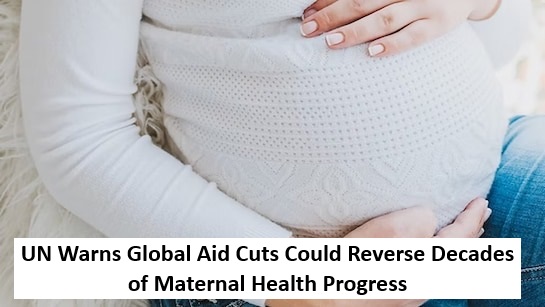
Recent reductions in global health aid, especially from wealthier nations like the United States, could have "pandemic-like effects" on maternal mortality rates, according to a warning issued by multiple UN agencies. Pregnant women in war-torn and unstable regions are particularly vulnerable, facing mortality risks up to five times higher than those in peaceful areas, The Guardian reported.
Pandemic Setback: Maternal Deaths Rose by 40,000 in 2021
A report partially funded by the U.S. revealed that maternal deaths surged by 40,000 in 2021 during the COVID-19 pandemic. The rise was not only due to the virus itself but largely due to disrupted maternal healthcare services. Experts now fear that the ongoing funding reductions could lead to another widespread collapse in maternal care infrastructure.
US Funding Cuts Already Impacting Services
The World Health Organization (WHO) confirmed that recent U.S. aid cuts have already resulted in the closure of clinics, disrupted medical supply chains, and the termination of healthcare staff. These disruptions hinder access to essential care for pregnancy complications such as haemorrhage, pre-eclampsia, and malaria — all major contributors to maternal deaths.
Progress Stalling on Global Maternal Health Goals
While maternal mortality decreased by 40% globally from 2000 to 2023, progress has significantly slowed since 2016. The world is far off track to meet the Sustainable Development Goal (SDG) of reducing maternal deaths to below 70 per 100,000 live births by 2030 — which would now require mortality rates to decline at ten times the current speed.
Sharp Inequality in Maternal Mortality Rates
In 2023, 346 women per 100,000 live births died in low-income nations, compared to just 10 per 100,000 in high-income countries. Access to trained healthcare providers during childbirth remains low in poorer regions (73%) compared to wealthier ones (99%).
Conflict Zones See Highest Mortality Burden
War-affected and politically unstable countries accounted for 61% of all maternal deaths in 2023, despite representing only 25% of total global births. A teenage girl in these fragile regions faces a 1 in 66 chance of dying from a pregnancy-related issue — increasing to 1 in 51 in active conflict zones.
Calls for Immediate Reinvestment in Maternal Healthcare
Catherine Russell, Executive Director of UNICEF, warned that health system collapses in vulnerable regions are "risking more expectant mothers." She stressed the need to strengthen frontline healthcare systems, especially midwives and community nurses.
WHO’s Dr. Pascale Allotey described the situation as "a travesty of justice", urging the global community to take collective responsibility in safeguarding maternal health and ensuring safe childbirth.
Read More: Bangladesh Extremists Burn Hindu Residence and Warn Minority Community of Consequences

 Share
Share



